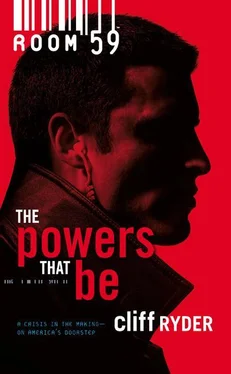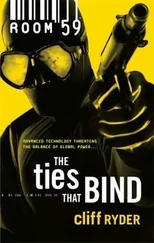Cliff Ryder - The Powers That Be
Здесь есть возможность читать онлайн «Cliff Ryder - The Powers That Be» — ознакомительный отрывок электронной книги совершенно бесплатно, а после прочтения отрывка купить полную версию. В некоторых случаях можно слушать аудио, скачать через торрент в формате fb2 и присутствует краткое содержание. Жанр: Триллер, Шпионский детектив, на английском языке. Описание произведения, (предисловие) а так же отзывы посетителей доступны на портале библиотеки ЛибКат.
- Название:The Powers That Be
- Автор:
- Жанр:
- Год:неизвестен
- ISBN:нет данных
- Рейтинг книги:3 / 5. Голосов: 1
-
Избранное:Добавить в избранное
- Отзывы:
-
Ваша оценка:
- 60
- 1
- 2
- 3
- 4
- 5
The Powers That Be: краткое содержание, описание и аннотация
Предлагаем к чтению аннотацию, описание, краткое содержание или предисловие (зависит от того, что написал сам автор книги «The Powers That Be»). Если вы не нашли необходимую информацию о книге — напишите в комментариях, мы постараемся отыскать её.
The Powers That Be — читать онлайн ознакомительный отрывок
Ниже представлен текст книги, разбитый по страницам. Система сохранения места последней прочитанной страницы, позволяет с удобством читать онлайн бесплатно книгу «The Powers That Be», без необходимости каждый раз заново искать на чём Вы остановились. Поставьте закладку, и сможете в любой момент перейти на страницу, на которой закончили чтение.
Интервал:
Закладка:
The flight attendant welcomed the passengers to Miami, and he let the words skate over him as he waited for the plane to stop moving, looking like any of the other European tourists or businessmen coming to America. The plane taxied to a stop, and Jonas got out of his seat and removed his small overnight bag from the overhead compartment.
Slinging it over his shoulder, he waited for the door to open and walked through the airport to the baggage claim.
Miami International Airport bustled with the start of the tourist season, but Jonas didn’t give the assorted wildlife, animal or human, a second glance, scanning the crowd for his contact instead.
A young Hispanic man, dressed in sandals, khakis and a brightly colored shirt held a simple cardboard sign with his cover name on it. Jonas walked over and looked him up and down, then started walking again, the younger man falling into step beside him. “I didn’t expect it to be this warm,”
Jonas said.
“It’s not the heat but the humidity that gets to most people. You’ll get used to it soon enough,” the young man replied.
“I suppose a good night’s sleep will help.” The conversation was innocuous enough, but Jonas had given the proper initial code phrase, and more importantly, his contact had given the correct reply, word for word.
Jonas held out his hand. “Pleased to meet you, Mr. Azul.”
His new acquaintance took it and shook briskly. “Like-wise, Mr. Heinemann. But don’t you think this is all rather melodramatic?”
“How so?”
“This back and forth we just did, like something out of the movies. I’d have thought our handlers would have sent a photo of me to your cell to compare faces.”
Actually, Jonas did have that, but he knew that his adver-saries could always disguise themselves, as well. “Tell that to one of my friends in Europe back in 1987. During a trip behind the Iron Curtain, his contact was made, apprehended and replaced with a government agent. The man said one wrong word when he gave the counter, but my friend passed it off as nervousness and went with him.”
“What happened?”
“He spent five years in a Bulgarian prison before being swapped in a trade. His career was over, his health was shattered and he died soon after. All because of one simple wrong word.”
“Point taken.” The younger man glanced up at him. “I have to admit, you’re not what I expected.”
“Oh, you were thinking someone younger?”
“No, I read your file. You just appear to be in much better shape than your picture would indicate. Taller, too.”
Jonas glanced sidelong at the young man, but got no hint of animosity or insult from him; he had just stated a simple fact. “I do my best.”
“Any baggage?”
“Just what you see here.”
“You didn’t bring any clothes?”
“My wardrobe wasn’t appropriate for this assignment.”
In response to the younger man’s quizzical look he said, “I don’t own a two-thousand-dollar suit. Yet.”
“So we’ll need to go shopping?”
“At the best tailor in town.”
“That’s gonna be expensive.”
“Don’t worry.” Jonas patted his pocket. “It will all be taken care of. In a couple of days it will be time for me to make my entrance into Cuban-exile society.”
Damason rested his head on one hand as he held an ancient black Bakelite telephone receiver to his ear. Stifling a yawn, he tried to pay attention to his commanding officer’s stream of orders and questions.
“Yes, colonel. I have followed up on all of the freed women, and their various consulates are working on getting them back home, as well. No, at this time I have not yet received a report concerning the interrogation. I will get it as soon as possible.
Yes, of course we wish to eradicate this loathsome pestilence of human smuggling. I will keep you informed at all times.
Thank you, colonel. ¡Sí, viva la revolución! ”
He replaced the receiver and rested his head in his hands.
Since the morning’s activity he’d had about two hour’s sleep, and now felt as if the smugglers’ panel truck had run him over. However, there were still a few hours to go until he could rest. Even then he knew his respite might be brief, for army officers were supposed to be “vigilant and ready to fight for the revolution at all times,” according to one of their leader’s interminable, three-hour speeches he often inflicted on the military.
Indeed, if the man spent as much time working on the problems of our nation as he did haranguing its citizens, we would be the most powerful country in the world, Damason thought. He pushed back on the two legs of his chair, feeling the old wood creak beneath him. Like everything else in his tiny office, the furniture was worn to its breaking point. Every time he leaned back, he half expected to end up on the ground as the battered piece of furniture, used beyond its ability, finally collapsed under his weight. So far, however, it hadn’t happened.
If only my faith in our leader was as strong, he mused. In the beginning, it had not been that way. Indeed, there had been no other way but the revolution. Raised as an orphan during the turbulent 1970s, Damason had gone to a state-run school, where he had been indoctrinated into the Communist phi-losophy and, having nothing else in his life, had embraced it fervently, becoming one of the revolution’s most ardent supporters. For him, the only way forward was to join the army of the revolution, pledging to fight against all oppressors of the glorious Cuban state. His ascent through the ranks, first as a member of Castro Rebel Youth group, then as a full-fledged member of the army at age eighteen, was rapid and distinguished. Too young for service in Angola, Ethiopia or Nicaragua, Damason became a soldado just two years before the U.S.S.R. collapsed in 1991, cutting off all funding to Cuba.
At the time, Damason had still believed that Castro would find a way to enable his country to regain its footing. Even through the crippling recession, blackouts and food short-ages, the struggle to create industries and goods to export for much-needed technology, medicines and other supplies, he had believed El Comandante’s assurances that Cuba’s health care was supreme, and that their country would weather this “special period.” Like the rest of the army, Damason spent much of his time ferreting out traitors, political dissidents and informers, anyone who could be working against the revolution. He had sent many to his nation’s infamous prisons.
But even then he had seen signs that there were problems with Castro’s idea of a peaceful, content Communist nation.
The hasty trial and execution of Arnaldo Ochoa Sánchez in 1989, one of the finest generals Cuba had ever known and a hero of the revolution, had forced Damason to reconsider his blind faith in Castro and his vision for Cuba. The soldado had heard nothing but praise for “El Moro,” as his soldiers and other officers had referred to him, yet suddenly he was on trial for drug smuggling, corruption and treason. His swift execution, and the widespread rumor that it was because he was a realist who agreed with many of Mikhail Gorbachev’s reforms instead of an ideologue toeing Castro’s inflexible party line, had caused the first crack in Damason’s previously unshakable dedication to the cause.
Then he, along with several dozen other officers, had been sent to Europe under a pilot program spearheaded by Raul Castro to learn accounting and business practices. They were to return to the island and use this new knowledge to improve the infrastructure as the military began its steady takeover of many Cuban business sectors, including agricul-ture, the tourist trade, air transportation and much more.
Читать дальшеИнтервал:
Закладка:
Похожие книги на «The Powers That Be»
Представляем Вашему вниманию похожие книги на «The Powers That Be» списком для выбора. Мы отобрали схожую по названию и смыслу литературу в надежде предоставить читателям больше вариантов отыскать новые, интересные, ещё непрочитанные произведения.
Обсуждение, отзывы о книге «The Powers That Be» и просто собственные мнения читателей. Оставьте ваши комментарии, напишите, что Вы думаете о произведении, его смысле или главных героях. Укажите что конкретно понравилось, а что нет, и почему Вы так считаете.











